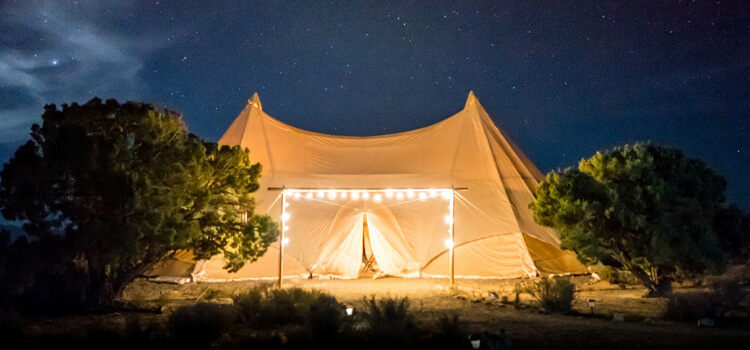As an Amazon Associate, I earn from qualifying purchases.

How much should a backpacking tent weight? Any backpacking tent should not be more than 5 pounds. The lightweight tent is around 2-3 pounds. Anyone going for an outdoor adventure should choose the right backpacking tent. The good news is that the tent will not be a problem with modern technology. Ideal materials for tents have allowed for the creation of a lightweight tent with maximum resistance to cold and comfort. It means more seasoned backpackers might choose simple tents emphasizing minimalism. The minimalist design lowers the weight and allows them to take the tent on more demanding hikes.
Factors Influencing Tent Weight
Hikers should know what particular outcomes the chosen issues of their backpacking tent would have in terms of the weight. Several factors determine how heavy or light the tent is. Below are those that influence this factor.
Material Selection
This avenue is connected to various components. Each of the types mentioned above correlates with a certain weight, affecting the tent overall.
- Nylon: it is regarded as light and durable, which is commonly used for most tents;
- Polyester: although heavier than nylon, this material holds a better resistance to UV;
- Cuban fiber: it is lightweight and strong, yet it is considered expensive;
Design Complexity
The solutions with several roofs or highly developed pole systems will also be weighter. The correct tent for oneself should be a combination of light-weighting and comfort. Hikers should know these factors to make informed decisions. A precisely more functionality entails more weight as well. Namely, simple tents have light design, and their more complex counterparts possess more fancy forms. More heavy tent patterns may include such constituents as:
- Number of doors;
- Sorts of pole systems;
- Additional tools for keeping one’s bags and shoes;
Types Of Backpacking Tents
A suitable backpacking tent is needed for each hiker who wants to organize an outdoor journey. The weight of the tent has a significant impact on a person’s rid quality and endurance. Below, the types of backpacking tents that are introduced are suitable for the conditions in which they are used.
Ultralight Tents
Ultralight tents are the wishes of all hikers who care about their weights. Such tents are distinguished by their low weight but protection . Such tents are suitable for tough road trip and protect hikers at relatively low temperatures.
- Weight: Usually less than 2 pounds;
- Materials: The more light armies, such as nylon and polyester, are popular;
- Design: Hardly complex model, often with lower supports, less headroom;
Three-Season Tents
Three-season tents are adaptable shelters only during the ripe, summer, and harvest time. They balance wight, water resistance, and ventilation factors. Such entities are comfortable with light snow heaps but not sui for tougher weather.
| Weight | Materials | Features |
| 3 to 5 pounds (1.4 to 2.3 kg) | Durable fabrics, mesh panels | Weather-resistant coatings, ample mesh for airflow |
Four-Season Tents
Such units are designed to protect from extreme conditions. They are robust hail, shift, and water-resistant, and not utilized in hot summers but during the relaxation time, winter.
- Weight: In general, more than 5 pounds. The people, who hunt in the rural or hide from the crowd spend more time there but do not feel such a weight;
- Construction: Poles, and tires fabrics. hese tents are considerably heavier than other models because they include fewer nets;
- Design: More insulation, or accordion deuce only for simple unit protections;
Ideal Tent Weight For Backpacking
Backpacking is usually the perfect balance between weight and practicality. It is one of the four essentials; the sleeping bag, backpack, and sleeping pad. Therefore, the choice of your tent determines the kind of shelter you will have during your hiking expedition. At the same time, it is one of the items that could significantly contribute to making your pack weigh heavily. However, your tent should be a feel of a feather when packed but still offer the shelter that you need during your backpacking.
Weight Considerations For Different Seasons
Different seasons would also determine the extent and nature of the weight you expect to find. Therefore, expected weight is as follows:
- Summer Tents: Expect around 1 – 2 pounds per person;
- Three-Season Tents: Usually weight 2 -3 pounds per person;
- Four-Season Tents: Above 3 pounds per person;
Trade-offs Between Weight And Durability
Sacrificing the tent for its weight could as well expose you to the dangers of losing it in case of a slight wind. Additionally, the fundamental trade-offs also fall within the choice of the tent, which are Ultralightness, lightweight and standard weight of the tent.
| Weight | Durability | Material |
| Ultralight | Less | Silnylon, Dyneema |
| Lightweight | Moderate | Ripstop Nylon |
| Standard | High | Polyester, Canvas |

Tips For Reducing Tent Weight
When hitting the trail backpackers, it is known that every ounce counts. A heavy tent can weigh you down and dampen your experience. Therefore, reducing tent weight is crucial for a successful backpacking adventure.
Selecting Lightweight Materials
Material type plays a great role in determining the weight of your tent. Below are some tips to choose the lightest materials:
- Nylon and Polyester: Are usually lighter than traditional cotton or canvas;
- Silicone-Coated Fabric: So that it is weather-resistant without the extra weight;
- Carbon Fiber: The lightest tent pole material compared to traditional aluminum;
You should also check the denier on the fabric; this symbolically signifies the thickness of the threads; the lower the number, the lighter the material. However, you want to strike a balance with durability.
Minimizing Extra Features
Choose a tent that has only enough room for its occupants and their gear. It would be better to avoid the unnecessary aspects like storage pockets.
| Feature | Keep | Remove |
| Mud Flaps | ✓ | |
| Gear Lofts | ✓ | |
| Multiple Doors | ✓ | |
| Vestibules | ✓ |
Impact Of Tent Weight On Backpacking Experience
Light tents make work easier and are less durable, while heavy tents are comfortable but a lot of work. Thus it is important to strike a balance between the two to enjoy your backpacking experience. Your backpacking tent’s weight will determine.
Ease Of Carrying
The lighter the tent, the easier it is on your back. Aptly put, when using a light tent, it will feel like a gentle breeze on your back. Consider how tent weight has an implication on how you are investing in the baggage.
- More Fatigue: Your back and legs will thank you for the easy haul;
- Better Balance: Light tents mean less tripping and falling;
- More Space: Use light tents to save more rooms to pack other essentials away;
Setup And Takedown Time
Tent weight has an implication on time taken to open or close your tent. Light tents will have less gadget hence faster pitch and packaging.
- Quick Assembly: Ensuring you spend more time pitchers and less time attaching poles;
- Effortless Takedown: Packaging while going home, Get to pack up fast after sleeping and start hiking early;
- Simple Designs: Have less equipment to assemble hence easy to set up;
Common Mistakes When Considering Tent Weight
When packing your bag, the tent you choose can heavily influence the weight. But many people make easy mistakes to correct. Thus, they end up hiking with more weight than necessary. Or they select a tent unsuitable for their trip. Here are the most common mistakes.
Overlooking Weather Conditions
The perfect tent for you depends on the weather. However, many people skip this step. As a result, they select a lightweight tent, and the first storm sends it flying. Or they choose a stable one that’s too heavy for a calm hiking area.
- Review the weather before your journey;
- Pick a tent that is appropriate for the forecast;
- Balance weight with stability;
Ignoring Personal Comfort
The question of what’s comfortable is a matter of personal preference. For some people, the ideal tent is the lightest one. So they forget about spaciousness and have a cramped experience when sleeping. Others select the largest tent possible. But they finalize the trip with an increased backpack weight. Always test the tent before the trip to ensure you have the optimal convenience united with perfect lightweight characteristics.
| Tent Type | Weight | Comfort Level |
| Ultralight | Less than 3 lbs | Minimal |
| Lightweight | 3-5 lbs | Moderate |
| Luxury | 5 lbs and up | High |

Choosing The Right Tent Weight For Your Needs
Having appropriate tent weight is crucial. It influences your comfort, endurance, and safety. The perfect tent weight varies from one adventurer to another. Here is how you can find the right balance for yourself.
Assessing Personal Strength And Endurance
Backpacking tent should fit your personal strength. It means that if you are to hike for a long time, your tent should not much the strain on your body. It means that you should assess your fitness level and make sure that your tent is not too heavy for your muscles.
- Identify your base weight;
- Add your tent’s weight to that;
- Make sure that it is manageable and not too heavy;
Considering Terrain And Weather
Rugged terrains require durable and sometimes heavier tents as they are meant to endure harsh conditions. For calm terrains, it is better to choose lighter options.
| Terrain Type | Recommended Tent Weight |
| Mountainous | Sturdy, 5-7 lbs |
| Forest | Medium, 3-5 lbs |
| Plains | Light, 2-3 lbs |
Weather also matters. Windy weather requires heavier materials to stabilize your tent. For sunny and mild weather, choose ultralight tents. Consider this component:
- Tent weight to the terrains;
- Factor in the weather forecast;
- Choose the tent that is somewhere in between light enough but still protective;
Conclusion
Backpacking tent is one way of making an outdoor adventure ideal for a hiking experience. Consider the choice in terms of balance between comfort and weight. A lightweight tent is a good choice because it makes the hiking journey smooth and simple in every trek. Acquiring a durable and resistant tent in weather exposure guarantees one a happy trail and choice for an unforgettable experience.
Related Articles:
FAQs On How Much Should a Backpacking Tent Weight
No, 4 lbs is not at all, heavy for a backpacking tent. In fact, it is lightweight. A 4 lbs backpacking tent is optimum for a priority hiker.
Yes, a 5-pound tent is too heavy for backpacking. For the hiking preference, it is best by the way. The recommendation for an ideal tent is less than under 3 pounds.
A backpack seems heavy if it weighs more than 20% of a person’s body. Therefore, it is advisable to be a bit light headed.
The best weight for a big 3 backpacking tent is under 10 pounds combined. And that means a backpack, shelter and sleeping system.
As an Amazon Associate, I earn from qualifying purchases.
Leave a Reply